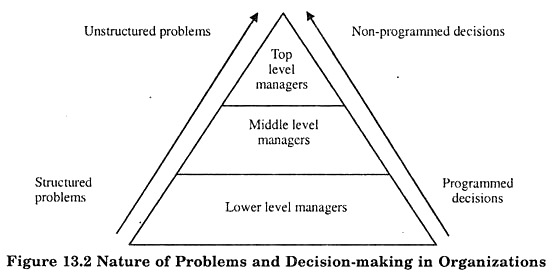This article throws light upon the two main types of managerial decisions. The types are: 1. Programmed Decisions 2. Non-programmed Decisions.
Managerial Decision: Type # 1. Programmed Decisions:
Programmed decisions are those that deal with simple, common, frequently occurring problems that have well-established and understood solutions. These decisions are made in routine, repetitive, well-structured situations, using predetermined decision rules that may be based on habit, established policies and procedures, or computational techniques.
For instance, if a manager of a distribution center knows from experience that he needs to keep a thirty-day supply of a particular item on hand, he can establish a system whereby the appropriate quantity is automatically reordered whenever the inventory drops below the thirty-day requirement.
As Figure 13.2 indicates, most programmed decisions are made by lower-level managers. This is because problems at the lower level of the organization are often routine and well-structured, and require less decision-making and discretion on the part of the manager.
ADVERTISEMENTS:
Programmed decisions can be made in less time, and are consistent and inexpensive in nature. For example, the presence of policies, procedures, and rules in organizations eliminates the need to identify and evaluate alternatives, and select a new alternative, each time a decision is to be made.
It would be rather time-consuming and expensive if a manager had to decide how to handle customer complaints on an individual basis. But, if the organization has a policy that states “Exchanges will be permitted on all purchases within 15 days” it simplifies matters considerably.
However, programmed decisions limit the flexibility of managers to a certain extent. But, at the same time, they save time and allow the decision-maker to devote his or her efforts to unique non-programmed decisions.
ADVERTISEMENTS:
Although effective managers depend on company policy in order to save time, they should, nevertheless, remain alert to the possibility of exceptional cases. For instance, company policy may impose a ceiling on the advertising budget for each product. However, a particular product may require an extensive advertising campaign to counter a new aggressive marketing strategy of a competitor.
In such a case, a programmed decision, that is, a decision to advertise the product in accordance with budget guidelines might be a mistake. Thus, managers must use their own judgment to decide whether a situation calls for a programmed or a non-programmed decision.
Managerial Decision: Type # 2. Non-programmed Decisions:
Non-programmed decisions are those that deal with unusual or exceptional problems. Since non- programmed decisions involve situations that are novel and/or ill-structured, predetermined decision rules are impractical for such decisions.
Most of the important decisions that managers make fall into the non-programmed category. Decisions that involve strategies to deal with mergers, acquisitions, takeovers and organization design, are non-programmed by nature. So also are decisions pertaining to new facilities, new products, labor contracts, and legal issues.
ADVERTISEMENTS:
If a problem has not occurred often enough to be covered by company policy i.e. if it is not recurring in nature, or is not so important that it deserves special treatment, it should be resolved by means of a non-programmed decision. For instance, problems such as how to allocate an organization’s resources, what to do about a failing product line, etc. usually require non-programmed decisions.
As Figure 13.2 indicates, most non-programmed decisions are made by upper-level managers, because these are the managers who have to deal with unstructured problems.
Because of their nature, non-programmed decisions usually involve a lot of uncertainty, a condition where the decision-maker has to choose a course of action without having complete knowledge of the consequences that will follow its implementation.
Managers taking non-programmed decisions must treat each situation as unique and distinct from others. They need to invest enormous amounts of time, energy and resources to explore the situation from all perspectives. Intuition and experience are major factors in non-programmed decisions. Managers should strive to convert as many decisions as possible into programmed ones.
ADVERTISEMENTS:
Many organizations treat routine decisions such as decisions involving inventory control, supplier selection and individual salary decisions, as special decision areas requiring unique solutions. Some of these can be converted into programmed decisions for the greater part, so that the manager can devote more time and effort towards taking decisions that are not programmable.
